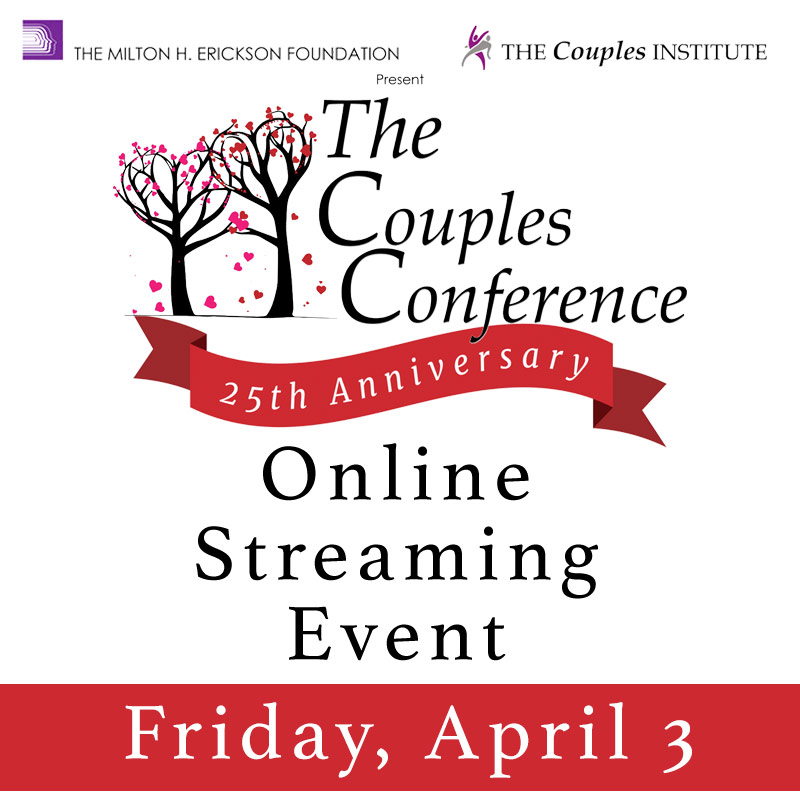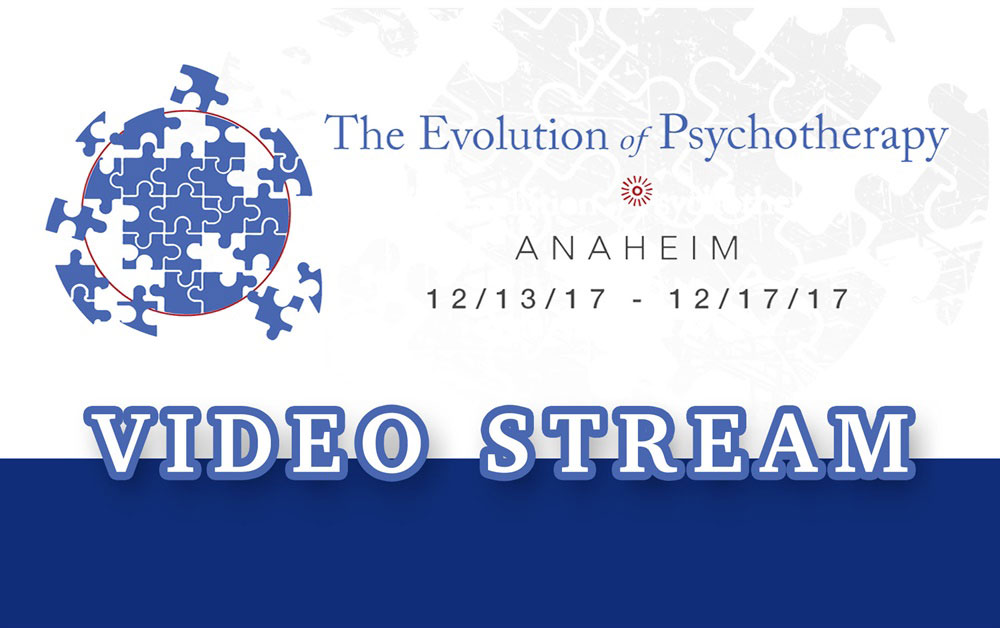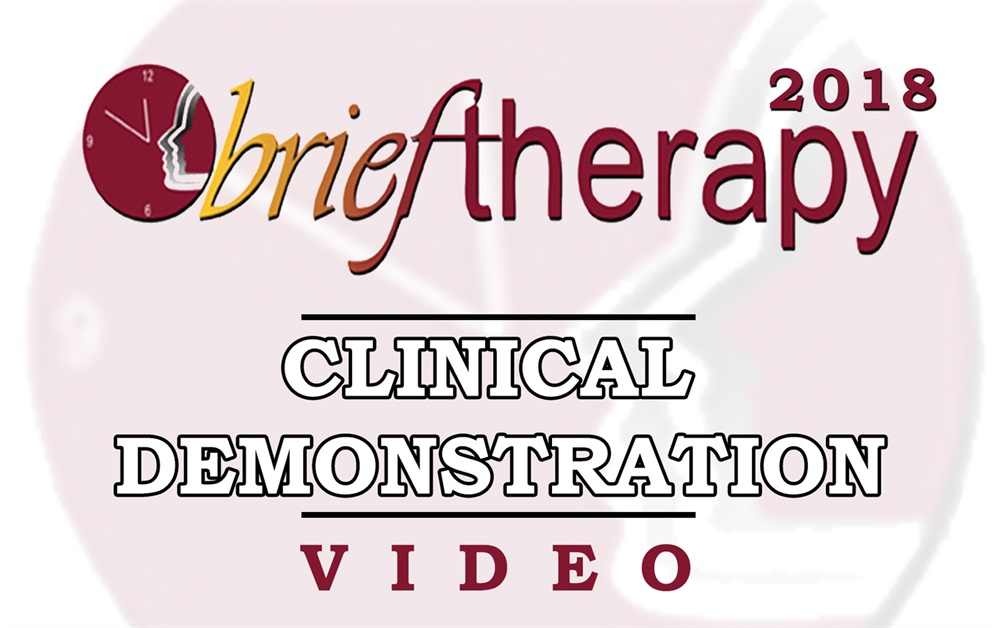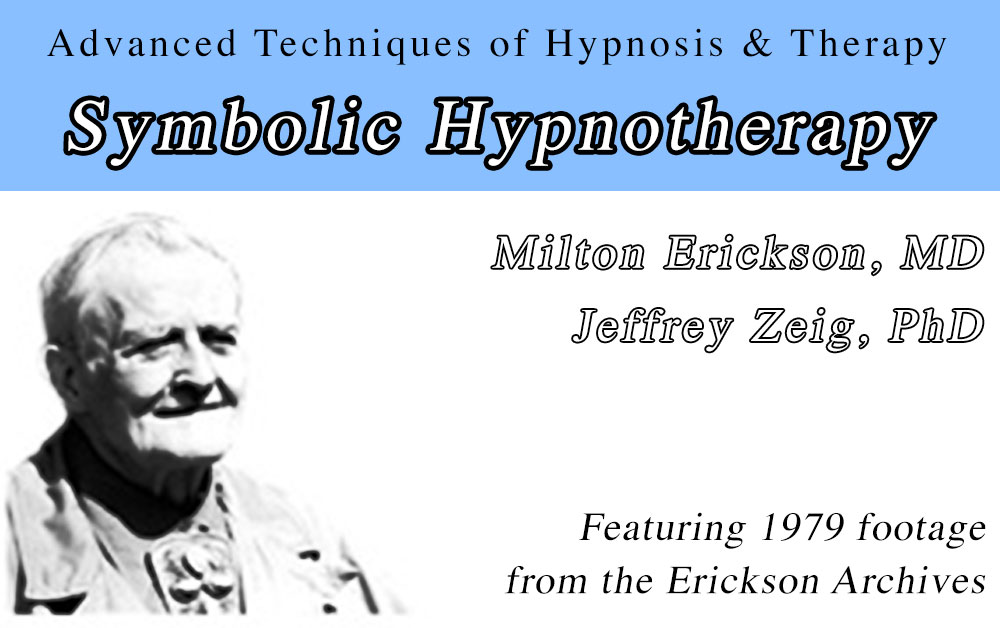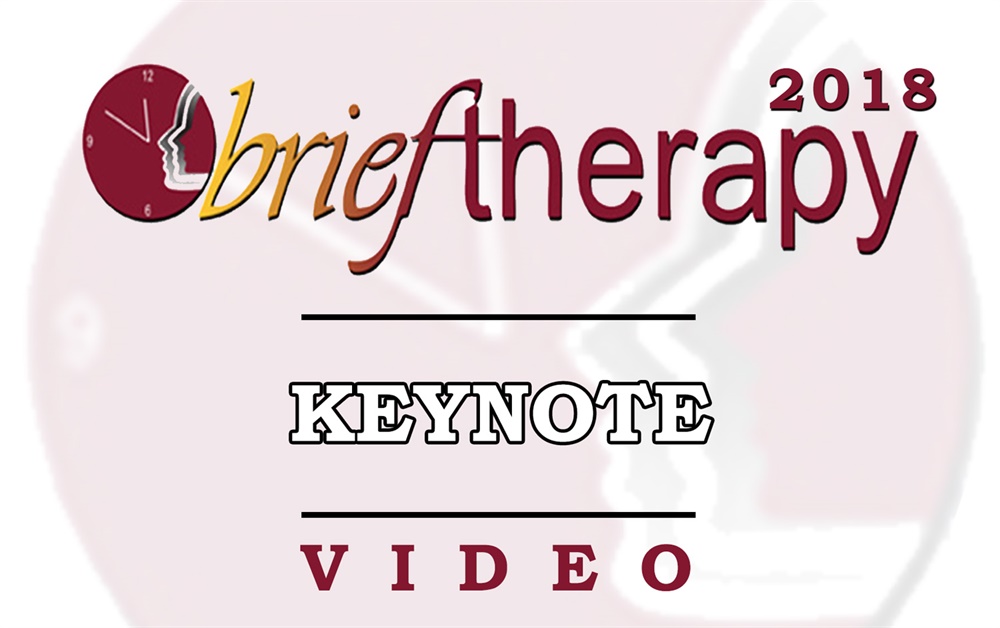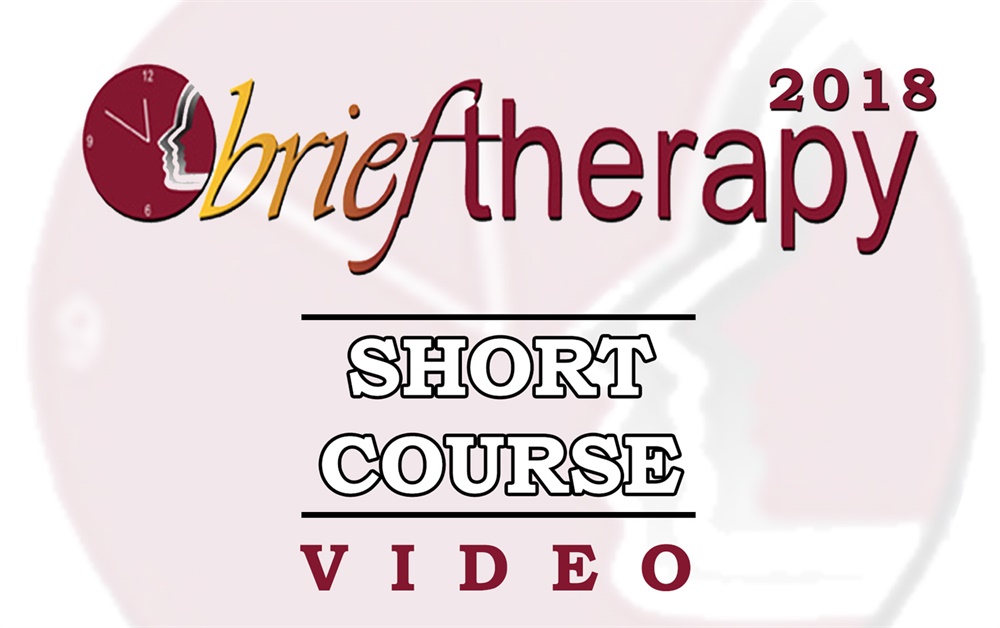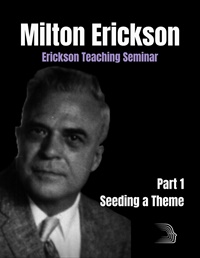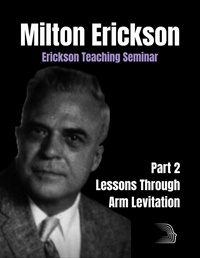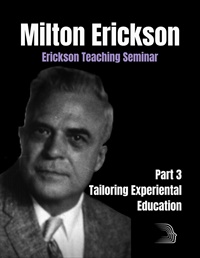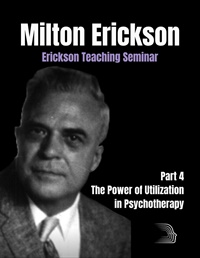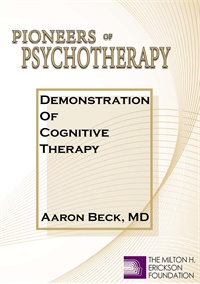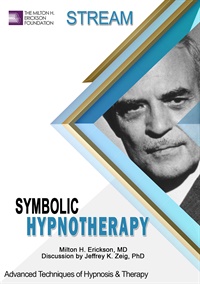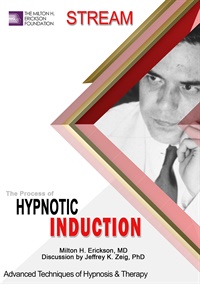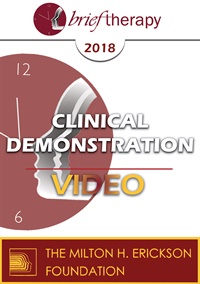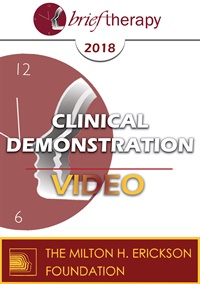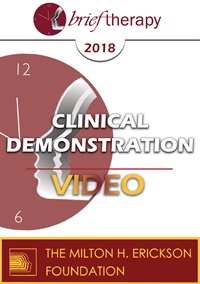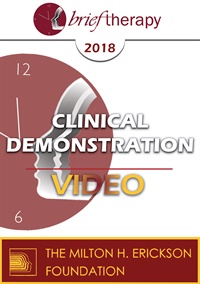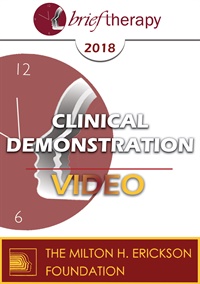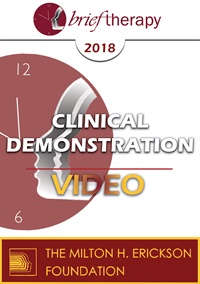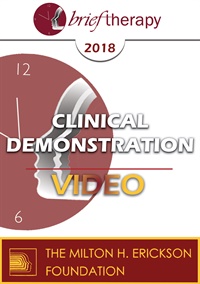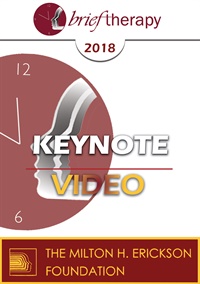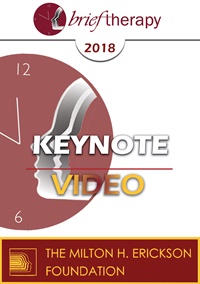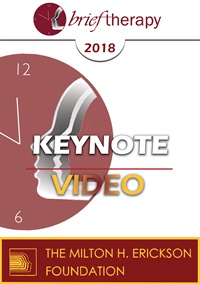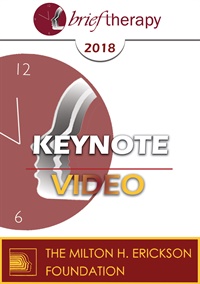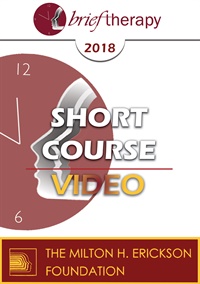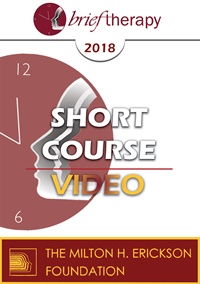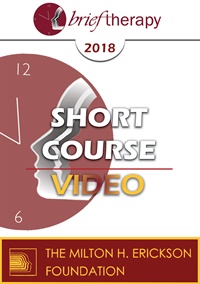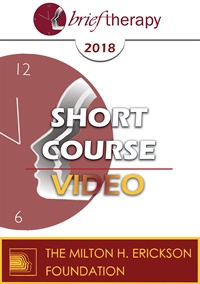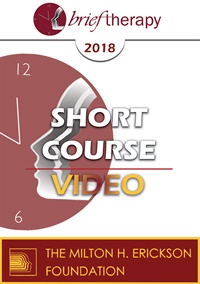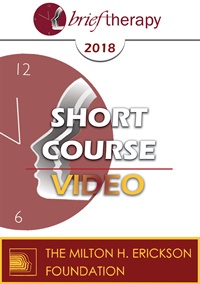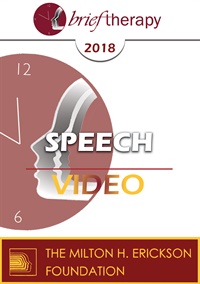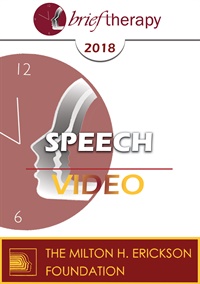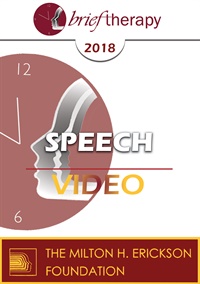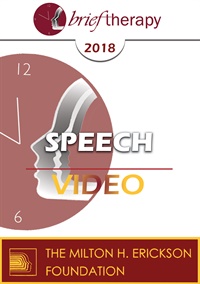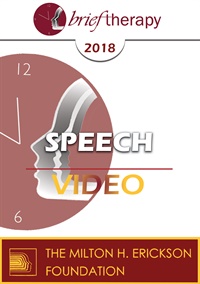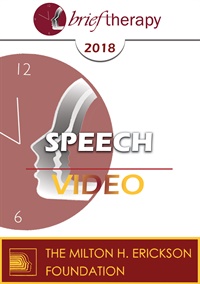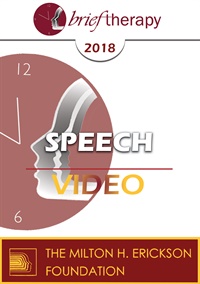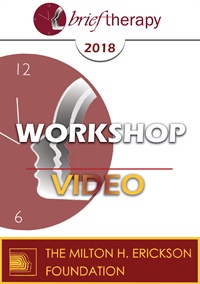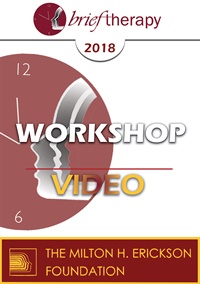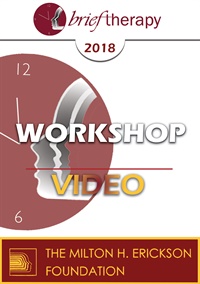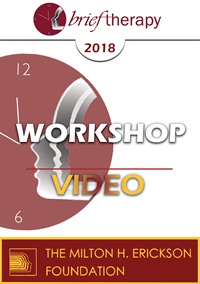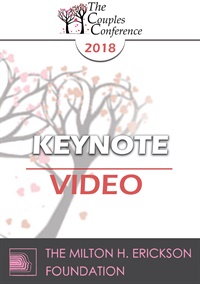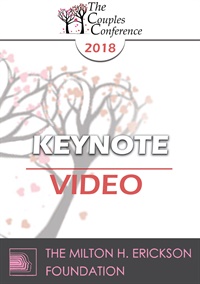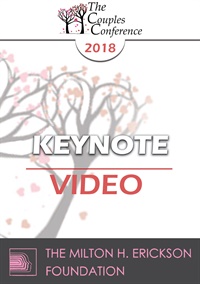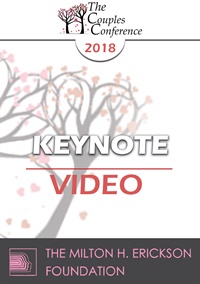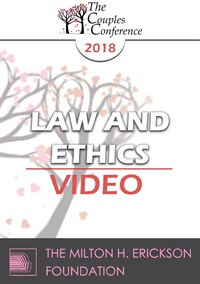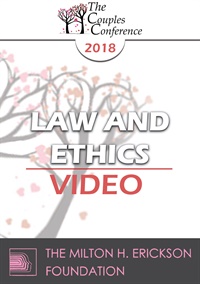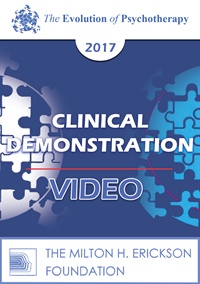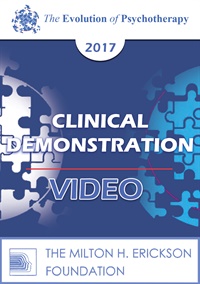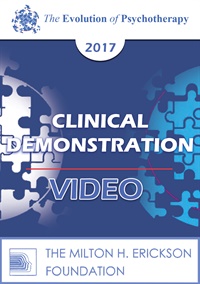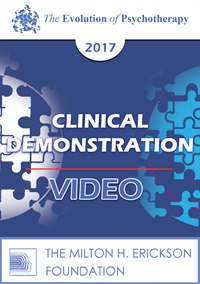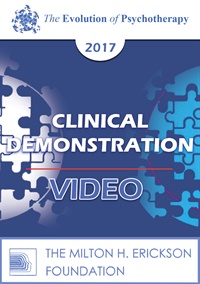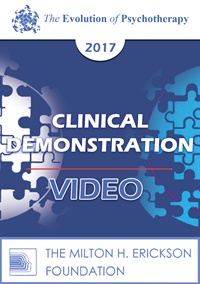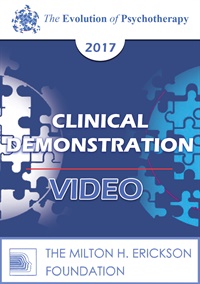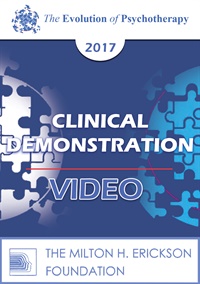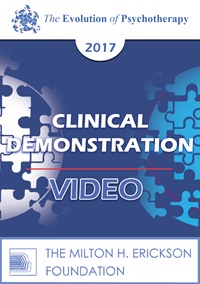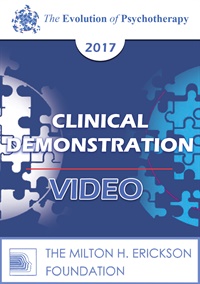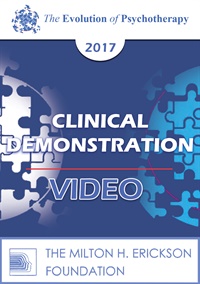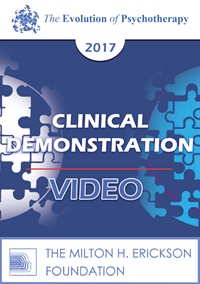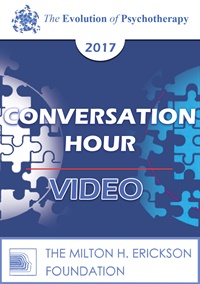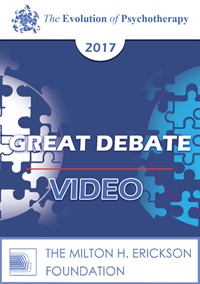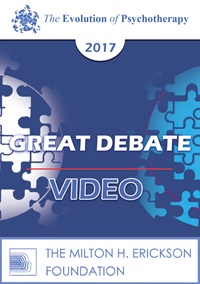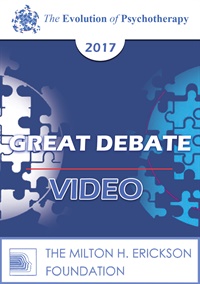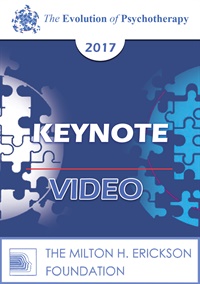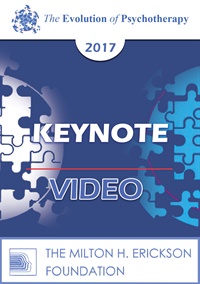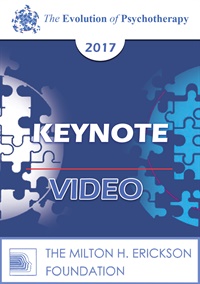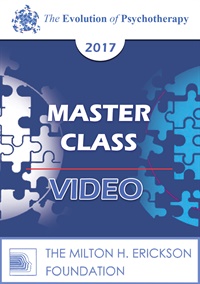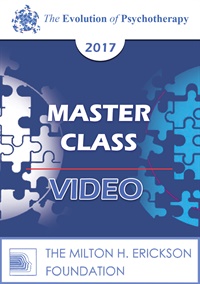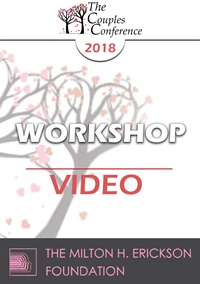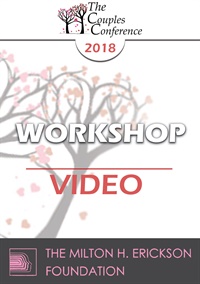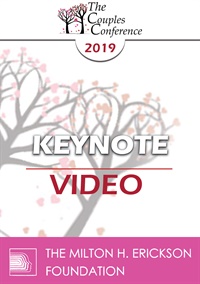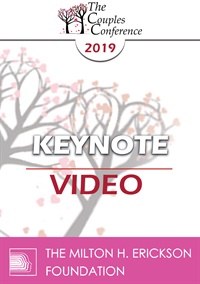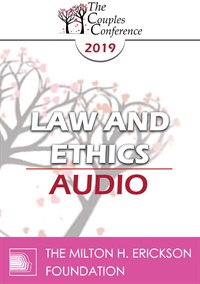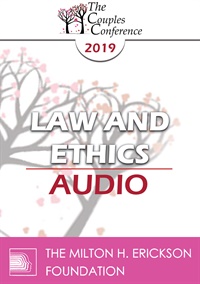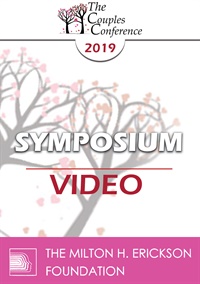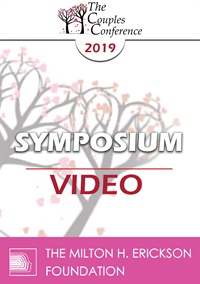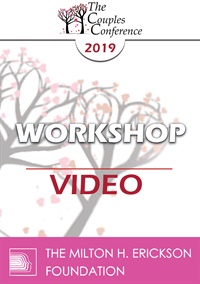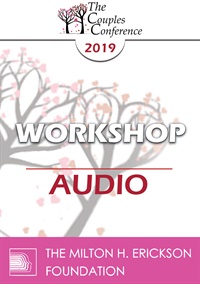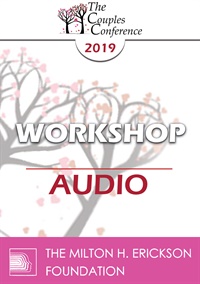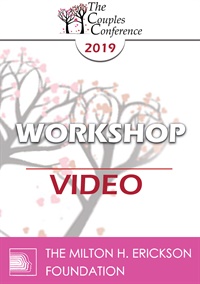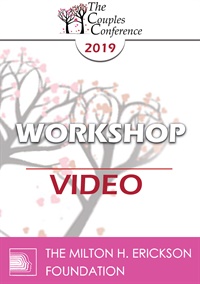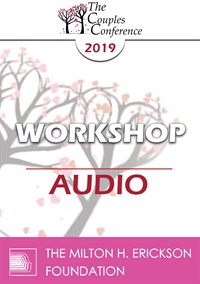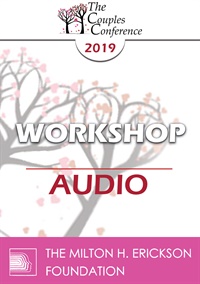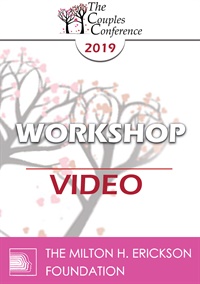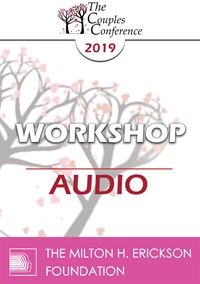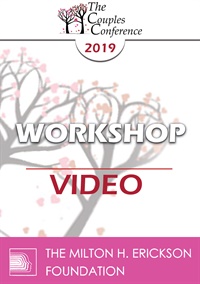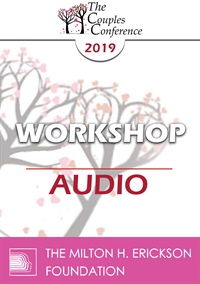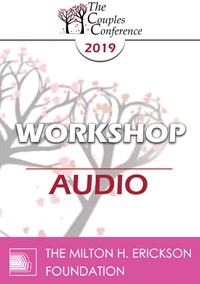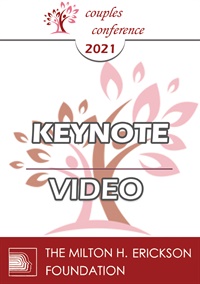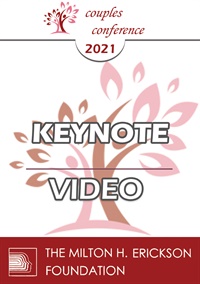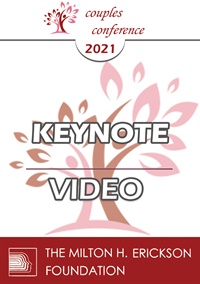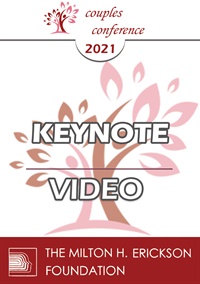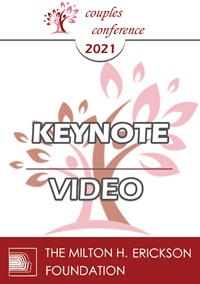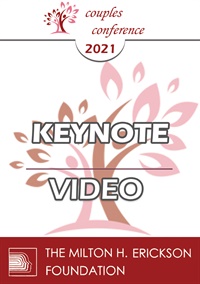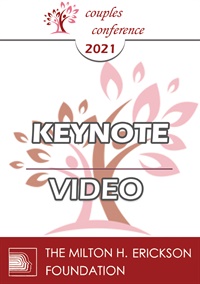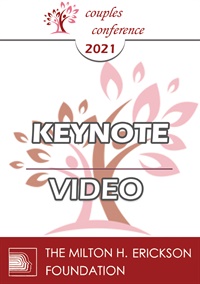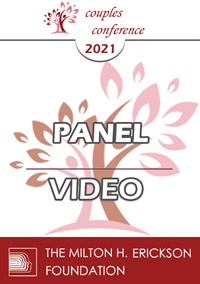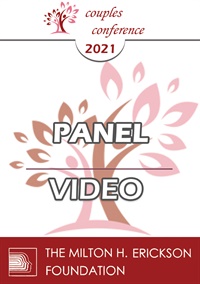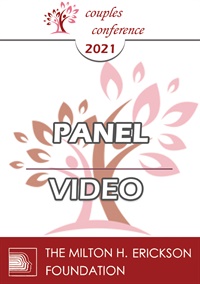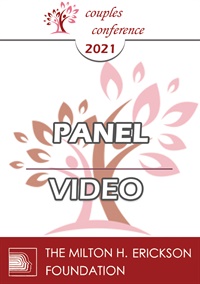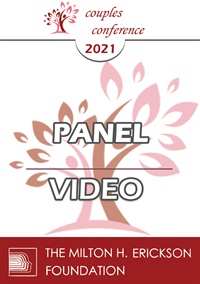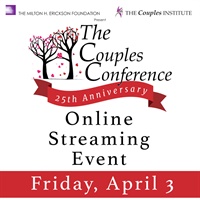Online Continuing Education
Expand your psychotherapy knowledge base with the Erickson Foundation online
HOW IT WORKS
Learn and develop new therapeutic techniques at your own pace,
easily, online in three simple steps.
1. Select and order a video from our archive.

2. Purchase the online continuing education credit add-on either during checkout, or add it on afterwards.

3. Watch the video, take a quiz, complete the evaluation, and get your certificate of completion instantly.

Featured Program
A sampler of the 2020 Couples Conference was streamed for professionals who had originally registered for the Couples Conference and is now available to all of our customers. The abbreviated program consists of dialogues with eight experts and was recorded. Included are common topics encountered by couples therapists: Infidelity, communication breakdowns, sexuality, gender, acting out, and transgender issues. This video includes Q&A from participants.
This video features eight unique approaches to couples therapy, featuring Ellyn Bader, Joseph Winn, Terry Real, Harville Hendrix and Helen Hunt, Martha Kauppi, Stan Tatkin, William Doherty and Shawn Giammattei.
This is an excerpt from the Milton H. Erickson's Couples Conference 2020 featuring Terry Real.
Relational Life Therapy occurs in three phases - waking up the client, moving the problem back and locating the family of origin for the issue, and teaching the client the skills to cope with their situation. The combination of all three of these aspects - loving confrontation, the inner child trauma work, and finally the skill building - makes profound change in couples therapy happen quickly.
Learn more about this model, as well as a variety of other approaches to successfully approach couples therapy by ordering the full 4 hour Couples Conference 2020 event.
Highlighted Online CE Sessions
The Clinical Application of Mindfulness and Compassion
Jack Kornfield, PhD
This demonstration combines Buddhist psychology, and Eastern approaches of Mindfulness and compassion with Western clinical tools.
The Structure of Generative Change in Psychotherapy
Stephen Gilligan, PhD
This live demonstration will show the 6-step model for generative change: (1) opening a creative space, (2) setting a positive intention, (3) developing a creative state, (4) taking action steps, (5) transforming obstacles, and (6) homework and self-practices.
Milton Erickson, MD / Jeffrey Zeig, PhD
This video features hypnotherapy conducted by Erickson, with the same subject, on two consecutive days. Erickson demonstrates how symbols may be used as metaphoric forms of communication to foster new understandings. Zeig discusses Erickson’s technique.
Learning Tracks
Trauma
Treating Trauma Briefly and Respectfully
Bill O'Hanlon, MS, LMFT
This live demonstration will illustrate how to briefly connect with a client who has been suffering from some aftereffect from trauma and to help the client resolve some of that post-traumatic suffering.
If Trauma Changes the Brain What is Necessary for Effective Treatment
Bessel van der Kolk, MD
This workshop will show how trauma affects the developing mind and brain, and teach how trauma affects self-awareness and self-regulation. We will focus on the fundamental difference between trauma desensitization vs. integration and growth, and look at the difference between disrupted attachment and traumatic stress.
In an Unspoken Voice: How the Body Releases Trauma and Restores Goodness
Peter Levine, PhD
Traditionally, therapies have attempted to change perceptions of the world by means of reason and insight, with conditioning and behavior modification, or with drugs and medications. The trauma response is a set of defensive bodily reactions that people initially mobilize in order to protect themselves, both from threat, and then later, against feeling the crushing totality of their horror, helplessness and pain.
Energy Psychology: A Brief Therapy to Treat Trauma
Robert Schwarz, PsyD
Energy Psychology (EP) is a family of focused and brief approaches to releasing stuck energy in the mindbody system that usually is the result of unresolved small “t” or big “T” trauma. This workshop presents an elegant integration of Interpersonal neurobiology, polyvagal theory and memory reconsolidation that underlies energy psychology approaches to trauma treatment.
CBT - Cognitive Behavioral Therapy
Cognitive vs Experiential Emphases
Stephen Gilligan, PhD and Donald Meichenbaum, PhD
This exchange will focus on the classic question of whether good therapy should focus more on cognitive or experiential changes. The merits of each, and the possibility of a “both/and” partnership, are considered.
New Breakthroughs in Cognitive Therapy: Applications to the Severely Mentally Ill
Aaron Beck, MD and Judith Beck, PhD
According to a recent survey, Cognitive Therapy is now the leading form of psychotherapy throughout the world. Its application to the numerous psychological disorders, as well as medical problems, has been well documented. In recent years, Cognitive Therapy has been successfully applied to the most intractable and chronic disorders, such as severe mental illness.
Evolution of Cognitive Behavior Therapy
Donald Meichenbaum, PhD
This exchange will focus on the classic question of whether good therapy should focus more on cognitive or experiential changes. The merits of each, and the possibility of a “both/and” partnership, are considered.
Psychotherapy
Going off the Deep End: Rediscovering our Magical Roots in Healing and Psychotherapy
Scott Miller, PhD
It’s time for Western therapists to rediscover their magickal roots. This demonstration will identify and show possibilities for healing far beyond what the current and popular schools of thought defining psychotherapy would ever allow.
Using Stories to Create Change in Psychotherapy
Bill O'Hanlon, MS and Cloe Madanes, LIC, HDL
Bill O'Hanlon will demonstrate the gentle power of using stories to create change in therapy through two clinical demonstrations. Come witness the fun and evocative way stories can invite people into change.
In-Depth Thinking on the Role of Psychotherapy Today
Esther Perel, MA, LMFT
Esther Perel invites the listener into the raw intimate space of real anonymous couples who are participating in unscripted counseling sessions. In opening the closed doors of psychotherapy, she stands to redefine not only the boundaries of therapy, but also the communal nature of healing.
All Online CE Products
- Categories:
- Erickson Materials | Erickson Streaming Video Collection | Milton H. Erickson Collections | Online Continuing Education
- Faculty:
- Milton H. Erickson, MD | Jeffrey Zeig, PhD
- Duration:
- 1 hour
- Format:
- Audio and Video
- Average Rating:
- Not yet rated
- Price:
- $29.95 - Base Price
- Categories:
- Erickson Materials | Erickson Streaming Video Collection | Milton H. Erickson Collections | Online Continuing Education
- Faculty:
- Milton H. Erickson, MD | Jeffrey Zeig, PhD
- Duration:
- 1 hour
- Format:
- Audio and Video
- Average Rating:
- Not yet rated
- Price:
- $29.95 - Base Price
- Categories:
- Erickson Materials | Erickson Streaming Video Collection | Milton H. Erickson Collections
- Faculty:
- Milton H. Erickson, MD | Jeffrey Zeig, PhD
- Duration:
- 1 hour
- Format:
- Audio and Video
- Average Rating:
- Not yet rated
- Price:
- $29.95 - Base Price
- Categories:
- Erickson Materials | Erickson Streaming Video Collection | Milton H. Erickson Collections | Online Continuing Education
- Faculty:
- Jeffrey Zeig, PhD | Milton H. Erickson, MD
- Duration:
- 1 hour
- Format:
- Audio and Video
- Average Rating:
- Not yet rated
- Price:
- $29.95 - Base Price
- Categories:
- Pioneers of Psychotherapy | Online Continuing Education | Evolution of Psychotherapy | Evolution of Psychotherapy 1995
- Faculty:
- Aaron Beck, MD
- Duration:
- 00:59:00
- Format:
- Audio and Video
- Average Rating:
- Not yet rated
- Price:
- $59.00 - Base Price
- Categories:
- Advanced Techniques of Hypnosis & Therapy | Featured | Training Videos | Online Continuing Education | Milton H. Erickson Collections
- Faculty:
- Jeffrey Zeig, PhD | Milton H. Erickson, MD
- Duration:
- 02:38:00
- Format:
- Audio and Video
- Average Rating:
- Not yet rated
- Price:
- $75.00 - Base Price
- Categories:
- Advanced Techniques of Hypnosis & Therapy | Featured | Training Videos | Online Continuing Education | Milton H. Erickson Collections
- Faculty:
- Milton H. Erickson, MD | Jeffrey Zeig, PhD
- Duration:
- 01:54:00
- Format:
- Audio and Video
- Average Rating:
- Not yet rated
- Price:
- $75.00 - Base Price
- Categories:
- Advanced Techniques of Hypnosis & Therapy | Featured | Training Videos | Online Continuing Education | Milton H. Erickson Collections
- Faculty:
- Milton H. Erickson, MD | Jeffrey Zeig, PhD
- Duration:
- 02:27:00
- Format:
- Audio and Video
- Average Rating:
- Not yet rated
- Price:
- $75.00 - Base Price
- Categories:
- Advanced Techniques of Hypnosis & Therapy | Featured | Training Videos | Online Continuing Education | Milton H. Erickson Collections
- Faculty:
- Milton H. Erickson, MD | Jeffrey Zeig, PhD
- Duration:
- 1 Hour 55 Min
- Format:
- Audio and Video
- Average Rating:
- Not yet rated
- Price:
- $75.00 - Base Price
- Categories:
- Brief Therapy Conference | Brief Therapy Conference 2018 | Online Continuing Education
- Faculty:
- Jeffrey Zeig, PhD
- Duration:
- 58:06
- Format:
- Audio and Video
- Average Rating:
- Not yet rated
- Price:
- $29.00 - Sale Base Price - $59.00
- Categories:
- Brief Therapy Conference | Brief Therapy Conference 2018 | Online Continuing Education
- Faculty:
- Stephen Gilligan, PhD
- Duration:
- 57:55
- Format:
- Audio and Video
- Average Rating:
- Not yet rated
- Price:
- $29.00 - Sale Base Price - $59.00
- Categories:
- Brief Therapy Conference | Brief Therapy Conference 2018 | Online Continuing Education
- Faculty:
- Camillo Loriedo, MD, PhD
- Duration:
- 1:03:30
- Format:
- Audio and Video
- Average Rating:
- Not yet rated
- Price:
- $29.00 - Sale Base Price - $59.00
- Categories:
- Brief Therapy Conference | Brief Therapy Conference 2018 | Online Continuing Education
- Faculty:
- Lynn Lyons, LICSW
- Duration:
- 58:59
- Format:
- Audio and Video
- Average Rating:
- Not yet rated
- Price:
- $29.00 - Sale Base Price - $59.00
- Categories:
- Brief Therapy Conference | Brief Therapy Conference 2018 | Online Continuing Education | Pioneers in Couples and Family Therapy
- Faculty:
- Stan Tatkin, PsyD, MFT
- Duration:
- 1:00:43
- Format:
- Audio and Video
- Average Rating:
- Not yet rated
- Price:
- $29.00 - Sale Base Price - $59.00
- Categories:
- Brief Therapy Conference | Brief Therapy Conference 2018 | Online Continuing Education
- Faculty:
- Robert Dilts, BA
- Duration:
- 1:00:44
- Format:
- Audio and Video
- Average Rating:
- Not yet rated
- Price:
- $29.00 - Sale Base Price - $59.00
- Categories:
- Brief Therapy Conference | Brief Therapy Conference 2018 | Online Continuing Education
- Faculty:
- Michael Yapko, PhD
- Duration:
- 57:31
- Format:
- Audio and Video
- Average Rating:
- Not yet rated
- Price:
- $29.00 - Sale Base Price - $59.00
- Categories:
- Brief Therapy Conference | Brief Therapy Conference 2018 | Online Continuing Education
- Faculty:
- Reid Wilson, PhD
- Duration:
- 1:00:23
- Format:
- Audio and Video
- Average Rating:
- Not yet rated
- Price:
- $29.00 - Sale Base Price - $59.00
- Categories:
- Brief Therapy Conference | Brief Therapy Conference 2018 | Online Continuing Education
- Faculty:
- Bill O'Hanlon, MS
- Duration:
- 1:06:05
- Format:
- Audio Only
- Average Rating:
- Not yet rated
- Price:
- $15.00 - Base Price
- Categories:
- Brief Therapy Conference | Brief Therapy Conference 2018 | Online Continuing Education
- Faculty:
- Ronald Siegel, PsyD
- Duration:
- 1:02:29
- Format:
- Audio and Video
- Average Rating:
- Not yet rated
- Price:
- $29.00 - Sale Base Price - $59.00
- Categories:
- Brief Therapy Conference | Brief Therapy Conference 2018 | Online Continuing Education
- Faculty:
- Patricia Arredondo, EdD
- Duration:
- 1:03:49
- Format:
- Audio and Video
- Average Rating:
- Not yet rated
- Price:
- $29.00 - Sale Base Price - $59.00
- Categories:
- Brief Therapy Conference | Brief Therapy Conference 2018 | Online Continuing Education
- Faculty:
- Bessel van der Kolk, MD
- Duration:
- 1:06:32
- Format:
- Audio and Video
- Average Rating:
- Not yet rated
- Price:
- $29.00 - Sale Base Price - $59.00
- Categories:
- Brief Therapy Conference | Brief Therapy Conference 2018 | Online Continuing Education
- Faculty:
- Frank Sulloway, PhD
- Duration:
- 1:03:02
- Format:
- Audio and Video
- Average Rating:
- Not yet rated
- Price:
- $29.00 - Sale Base Price - $59.00
- Categories:
- Brief Therapy Conference | Brief Therapy Conference 2018 | Online Continuing Education
- Faculty:
- David Burns, MD
- Duration:
- 1:00:36
- Format:
- Audio and Video
- Average Rating:
- Not yet rated
- Price:
- $29.00 - Sale Base Price - $59.00
- Categories:
- Brief Therapy Conference | Brief Therapy Conference 2018 | Online Continuing Education
- Faculty:
- Ronald Alexander, PhD
- Duration:
- 1:31:13
- Format:
- Audio and Video
- Average Rating:
- Not yet rated
- Price:
- $29.00 - Sale Base Price - $59.00
- Categories:
- Brief Therapy Conference | Brief Therapy Conference 2018 | Online Continuing Education
- Faculty:
- Jeffrey Lazarus, MD, FAAP
- Duration:
- 1:09:51
- Format:
- Audio and Video
- Average Rating:
- Not yet rated
- Price:
- $29.00 - Sale Base Price - $59.00
- Categories:
- Brief Therapy Conference | Brief Therapy Conference 2018 | Online Continuing Education
- Faculty:
- Timothy Hallbom, MSW | Kris Hallbom, BA
- Duration:
- 1:17:03
- Format:
- Audio and Video
- Average Rating:
- Not yet rated
- Price:
- $29.00 - Sale Base Price - $59.00
- Categories:
- Brief Therapy Conference | Brief Therapy Conference 2018 | Online Continuing Education
- Faculty:
- Clifton Mitchell, PhD
- Duration:
- 1:28:19
- Format:
- Audio and Video
- Average Rating:
- Not yet rated
- Price:
- $29.00 - Sale Base Price - $59.00
- Categories:
- Brief Therapy Conference | Brief Therapy Conference 2018 | Online Continuing Education
- Faculty:
- Susan Pinco, PhD
- Duration:
- 1:31:28
- Format:
- Audio and Video
- Average Rating:
- Not yet rated
- Price:
- $29.00 - Sale Base Price - $59.00
- Categories:
- Brief Therapy Conference | Brief Therapy Conference 2018 | Online Continuing Education
- Faculty:
- Michael Munion, MA, LPC
- Duration:
- 1:29:43
- Format:
- Audio and Video
- Average Rating:
- Not yet rated
- Price:
- $29.00 - Sale Base Price - $59.00
- Categories:
- Brief Therapy Conference | Brief Therapy Conference 2018 | Online Continuing Education
- Faculty:
- Robert Schwarz, PsyD
- Duration:
- 1:29:42
- Format:
- Audio and Video
- Average Rating:
- Not yet rated
- Price:
- $29.00 - Sale Base Price - $59.00
- Categories:
- Brief Therapy Conference | Brief Therapy Conference 2018 | Online Continuing Education
- Faculty:
- Ronald Siegel, PsyD
- Duration:
- 1:00:31
- Format:
- Audio and Video
- Average Rating:
- Not yet rated
- Price:
- $29.00 - Sale Base Price - $59.00
- Categories:
- Brief Therapy Conference | Brief Therapy Conference 2018 | Online Continuing Education
- Faculty:
- Bill O'Hanlon, MS
- Duration:
- 57:49
- Format:
- Audio and Video
- Average Rating:
- Not yet rated
- Price:
- $29.00 - Sale Base Price - $59.00
- Categories:
- Brief Therapy Conference | Brief Therapy Conference 2018 | Online Continuing Education
- Faculty:
- Reid Wilson, PhD
- Duration:
- 1:01:32
- Format:
- Audio and Video
- Average Rating:
- Not yet rated
- Price:
- $29.00 - Sale Base Price - $59.00
- Categories:
- Brief Therapy Conference | Brief Therapy Conference 2018 | Online Continuing Education
- Faculty:
- Robert Dilts, BA
- Duration:
- 1:01:49
- Format:
- Audio and Video
- Average Rating:
- Not yet rated
- Price:
- $29.00 - Sale Base Price - $59.00
- Categories:
- Brief Therapy Conference | Brief Therapy Conference 2018 | Online Continuing Education
- Faculty:
- Michael Yapko, PhD
- Duration:
- 1:02:31
- Format:
- Audio and Video
- Average Rating:
- Not yet rated
- Price:
- $29.00 - Sale Base Price - $59.00
- Categories:
- Brief Therapy Conference | Brief Therapy Conference 2018 | Online Continuing Education
- Faculty:
- Lynn Lyons, LICSW
- Duration:
- 1:02:45
- Format:
- Audio and Video
- Average Rating:
- Not yet rated
- Price:
- $29.00 - Sale Base Price - $59.00
- Categories:
- Brief Therapy Conference | Brief Therapy Conference 2018 | Online Continuing Education
- Faculty:
- Stephen Gilligan, PhD
- Duration:
- 1:01:12
- Format:
- Audio and Video
- Average Rating:
- Not yet rated
- Price:
- $29.00 - Sale Base Price - $59.00
- Categories:
- Brief Therapy Conference | Brief Therapy Conference 2018 | Online Continuing Education
- Faculty:
- Laura Brown, PhD
- Duration:
- 1:03:11
- Format:
- Audio and Video
- Average Rating:
- Not yet rated
- Price:
- $29.00 - Sale Base Price - $59.00
- Categories:
- Brief Therapy Conference | Brief Therapy Conference 2018 | Online Continuing Education
- Faculty:
- Jeffrey Zeig, PhD
- Duration:
- 1:45:53
- Format:
- Audio and Video
- Average Rating:
- Not yet rated
- Price:
- $29.00 - Sale Base Price - $59.00
- Categories:
- Brief Therapy Conference | Brief Therapy Conference 2018 | Online Continuing Education
- Faculty:
- David Burns, MD | Jill Levitt, PhD
- Duration:
- 2:00:37
- Format:
- Audio and Video
- Average Rating:
- Not yet rated
- Price:
- $29.00 - Sale Base Price - $59.00
- Categories:
- Brief Therapy Conference | Brief Therapy Conference 2018 | Online Continuing Education | Pioneers in Couples and Family Therapy
- Faculty:
- Stan Tatkin, PsyD, MFT
- Duration:
- 2:00:42
- Format:
- Audio and Video
- Average Rating:
- Not yet rated
- Price:
- $29.00 - Sale Base Price - $59.00
- Categories:
- Brief Therapy Conference | Brief Therapy Conference 2018 | Online Continuing Education
- Faculty:
- Bill O'Hanlon, MS
- Duration:
- 1:42:03
- Format:
- Audio and Video
- Average Rating:
- Not yet rated
- Price:
- $29.00 - Sale Base Price - $59.00
- Categories:
- Brief Therapy Conference | Brief Therapy Conference 2018 | Online Continuing Education
- Faculty:
- Stephen Gilligan, PhD
- Duration:
- 2:00:04
- Format:
- Audio and Video
- Average Rating:
- Not yet rated
- Price:
- $29.00 - Sale Base Price - $59.00
- Categories:
- Couples Conference | Couples Conference 2018 | Online Continuing Education | Pioneers in Couples and Family Therapy
- Faculty:
- Ellyn Bader, PhD | Sue Diamond, MA, RCC
- Duration:
- 1:00:59
- Format:
- Audio and Video
- Average Rating:
- Not yet rated
- Price:
- $0.00 - $29.00
- Categories:
- Couples Conference | Couples Conference 2018 | Online Continuing Education
- Faculty:
- Helen E. Fisher, PhD
- Duration:
- 57:05
- Format:
- Audio and Video
- Average Rating:
- Not yet rated
- Price:
- $29.00 - Sale Base Price - $59.00
- Categories:
- Couples Conference | Couples Conference 2018 | Online Continuing Education | Pioneers in Couples and Family Therapy
- Faculty:
- Harville Hendrix, PhD | Helen LaKelly Hunt, PhD
- Duration:
- 54:42
- Format:
- Audio and Video
- Average Rating:
- Not yet rated
- Price:
- $29.00 - Sale Base Price - $59.00
- Categories:
- Couples Conference | Couples Conference 2018 | Online Continuing Education | Pioneers in Couples and Family Therapy
- Faculty:
- Terry Real, LICSW
- Duration:
- 33:57
- Format:
- Audio and Video
- Average Rating:
- Not yet rated
- Price:
- $0.00 - $29.00
- Categories:
- Couples Conference | Couples Conference 2018 | Online Continuing Education | Pioneers in Couples and Family Therapy
- Faculty:
- Stan Tatkin, PsyD, MFT
- Duration:
- 50:59
- Format:
- Audio and Video
- Average Rating:
- Not yet rated
- Price:
- $29.00 - Sale Base Price - $59.00
- Categories:
- Couples Conference | Couples Conference 2018 | Online Continuing Education
- Faculty:
- A. Steven Frankel, PhD, JD, ABPP
- Duration:
- 3:33:07
- Format:
- Audio and Video
- Average Rating:
- Not yet rated
- Price:
- $0.00 - $29.00
- Categories:
- Couples Conference | Couples Conference 2018 | Online Continuing Education
- Faculty:
- A. Steven Frankel, PhD, JD, ABPP
- Duration:
- 1:09:54
- Format:
- Audio and Video
- Average Rating:
- Not yet rated
- Price:
- $29.00 - Sale Base Price - $59.00
Evolution of Psychotherapy
- Categories:
- Evolution of Psychotherapy | Evolution of Psychotherapy 2017 | Online Continuing Education | Pioneers in Couples and Family Therapy
- Faculty:
- Harville Hendrix, PhD | Helen LaKelly Hunt, PhD
- Duration:
- 1:02:47
- Format:
- Audio and Video
- Average Rating:
- Not yet rated
- Price:
- $0.00 - $29.00
- Categories:
- Evolution of Psychotherapy | Evolution of Psychotherapy 2017 | Evolution of Psychotherapy Erickson Learning Track | Online Continuing Education
- Faculty:
- Michael Yapko, PhD
- Duration:
- 56:19
- Format:
- Audio and Video
- Average Rating:
- Not yet rated
- Price:
- $29.00 - Sale Base Price - $59.00
- Categories:
- Evolution of Psychotherapy | Evolution of Psychotherapy 2017 | Online Continuing Education
- Faculty:
- Jack Kornfield, PhD
- Duration:
- 1:02:22
- Format:
- Audio and Video
- Average Rating:
- Not yet rated
- Price:
- $29.00 - Sale Base Price - $59.00
- Categories:
- Evolution of Psychotherapy | Evolution of Psychotherapy 2017 | Online Continuing Education
- Faculty:
- Jean Houston, PhD
- Duration:
- 1:01:54
- Format:
- Audio and Video
- Average Rating:
- Not yet rated
- Price:
- $29.00 - Sale Base Price - $59.00
- Categories:
- Evolution of Psychotherapy | Evolution of Psychotherapy 2017 | Online Continuing Education
- Faculty:
- Steven Hayes, PhD
- Duration:
- 57:37
- Format:
- Audio and Video
- Average Rating:
- Not yet rated
- Price:
- $29.00 - Sale Base Price - $59.00
EP17 Clinical Demonstration 10 - Learn to Read Brain Scans: 50 cases in 60 Minutes - Daniel Amen, MD
- Categories:
- Evolution of Psychotherapy | Evolution of Psychotherapy 2017 | Online Continuing Education
- Faculty:
- Daniel Amen, MD
- Duration:
- 58:58
- Format:
- Audio and Video
- Average Rating:
- Not yet rated
- Price:
- $29.00 - Sale Base Price - $59.00
- Categories:
- Evolution of Psychotherapy | Evolution of Psychotherapy 2017 | Online Continuing Education
- Faculty:
- Peter Levine, PhD
- Duration:
- 43:37
- Format:
- Audio and Video
- Average Rating:
- Not yet rated
- Price:
- $29.00 - Sale Base Price - $59.00
- Categories:
- Evolution of Psychotherapy | Evolution of Psychotherapy 2017 | Evolution of Psychotherapy Psychotherapy Learning Track | Online Continuing Education
- Faculty:
- Scott Miller, PhD
- Duration:
- 58:43
- Format:
- Audio and Video
- Average Rating:
- Not yet rated
- Price:
- $29.00 - Sale Base Price - $59.00
- Categories:
- Evolution of Psychotherapy | Evolution of Psychotherapy 2017 | Online Continuing Education
- Faculty:
- Esther Perel, MA, LMFT
- Duration:
- 52 Minutes
- Format:
- Audio and Video
- Average Rating:
- Not yet rated
- Price:
- $29.00 - Sale Base Price - $59.00
- Categories:
- Evolution of Psychotherapy | Evolution of Psychotherapy 2017 | Evolution of Psychotherapy Psychotherapy Learning Track | Online Continuing Education | Pioneers in Couples and Family Therapy
- Faculty:
- Bill O'Hanlon, MS | Cloe Madanes, HDL, LIC
- Duration:
- 1:30:09
- Format:
- Audio and Video
- Average Rating:
- Not yet rated
- Price:
- $29.00 - Sale Base Price - $59.00
- Categories:
- Evolution of Psychotherapy | Evolution of Psychotherapy 2017 | Evolution of Psychotherapy Erickson Learning Track | Online Continuing Education
- Faculty:
- Stephen Gilligan, PhD | Sue Johnson, EdD
- Duration:
- 1:27:23
- Format:
- Audio and Video
- Average Rating:
- Not yet rated
- Price:
- $0.00 - $29.00
- Categories:
- Evolution of Psychotherapy | Evolution of Psychotherapy 2017 | Evolution of Psychotherapy Psychotherapy Learning Track | Online Continuing Education
- Faculty:
- Erving Polster, PhD | Peter Levine, PhD
- Duration:
- 1:25:10
- Format:
- Audio and Video
- Average Rating:
- Not yet rated
- Price:
- $29.00 - Sale Base Price - $59.00
- Categories:
- Evolution of Psychotherapy | Evolution of Psychotherapy 2017 | Evolution of Psychotherapy Erickson Learning Track | Online Continuing Education
- Faculty:
- Jeffrey Zeig, PhD | Otto Kernberg, MD
- Duration:
- 1:24:21
- Format:
- Audio and Video
- Average Rating:
- Not yet rated
- Price:
- $29.00 - Sale Base Price - $59.00
- Categories:
- Evolution of Psychotherapy | Evolution of Psychotherapy 2017 | Evolution of Psychotherapy Erickson Learning Track | Online Continuing Education
- Faculty:
- Robert Dilts, BA | Michael Yapko, PhD
- Duration:
- 1:24:12
- Format:
- Audio and Video
- Average Rating:
- Not yet rated
- Price:
- $29.00 - Sale Base Price - $59.00
- Categories:
- Evolution of Psychotherapy | Evolution of Psychotherapy 2017 | Evolution of Psychotherapy Erickson Learning Track | Online Continuing Education
- Faculty:
- Ernest Rossi, PhD | Kathryn Rossi, PhD | Jean Houston, PhD
- Duration:
- 1:31:30
- Format:
- Audio and Video
- Average Rating:
- Not yet rated
- Price:
- $29.00 - Sale Base Price - $59.00
- Categories:
- Evolution of Psychotherapy | Evolution of Psychotherapy 2017 | Online Continuing Education
- Faculty:
- Martin Seligman, PhD
- Duration:
- 1:00:51
- Format:
- Audio and Video
- Average Rating:
- Not yet rated
- Price:
- $29.00 - Sale Base Price - $59.00
- Categories:
- Evolution of Psychotherapy | Evolution of Psychotherapy 2017 | Evolution of Psychotherapy Trauma Learning Track | Online Continuing Education
- Faculty:
- Donald Meichenbaum, PhD | Bessel van der Kolk, MD
- Duration:
- 1:19:12
- Format:
- Audio and Video
- Average Rating:
- Not yet rated
- Price:
- $29.00 - Sale Base Price - $59.00
- Categories:
- Evolution of Psychotherapy | Evolution of Psychotherapy 2017 | Evolution of Psychotherapy Psychoanalysis Learning Track | Online Continuing Education | Pioneers in Couples and Family Therapy
- Faculty:
- Otto Kernberg, MD | Harville Hendrix, PhD | Helen LaKelly Hunt, PhD
- Duration:
- 1:26:26
- Format:
- Audio and Video
- Average Rating:
- Not yet rated
- Price:
- $29.00 - Sale Base Price - $59.00
- Categories:
- Evolution of Psychotherapy | Evolution of Psychotherapy 2017 | Evolution of Psychotherapy CBT Learning Track | Evolution of Psychotherapy Erickson Learning Track | Online Continuing Education
- Faculty:
- Stephen Gilligan, PhD | Donald Meichenbaum, PhD
- Duration:
- 1:19:30
- Format:
- Audio and Video
- Average Rating:
- Not yet rated
- Price:
- $29.00 - Sale Base Price - $59.00
- Categories:
- Evolution of Psychotherapy | Evolution of Psychotherapy 2017 | Online Continuing Education
- Faculty:
- Esther Perel, MA, LMFT | Marilyn Yalom, PhD
- Duration:
- 1:21:00
- Format:
- Audio and Video
- Average Rating:
- Not yet rated
- Price:
- $29.00 - Sale Base Price - $59.00
- Categories:
- Evolution of Psychotherapy | Evolution of Psychotherapy 2017 | Online Continuing Education
- Faculty:
- Rob Kapilow
- Duration:
- 1:35:16
- Format:
- Audio and Video
- Average Rating:
- Not yet rated
- Price:
- $0.00 - $29.00
- Categories:
- Evolution of Psychotherapy | Evolution of Psychotherapy 2017 | Online Continuing Education
- Faculty:
- Martin Seligman, PhD
- Duration:
- 1:01:48
- Format:
- Audio and Video
- Average Rating:
- Not yet rated
- Price:
- $29.00 - Sale Base Price - $59.00
- Categories:
- Evolution of Psychotherapy | Evolution of Psychotherapy 2017 | Evolution of Psychotherapy CBT Learning Track | Online Continuing Education
- Faculty:
- Aaron Beck, MD | Judith Beck, PhD
- Duration:
- 56:33
- Format:
- Audio and Video
- Average Rating:
- Not yet rated
- Price:
- $29.00 - Sale Base Price - $59.00
- Categories:
- Evolution of Psychotherapy | Evolution of Psychotherapy 2017 | Evolution of Psychotherapy Erickson Learning Track | Evolution of Psychotherapy Psychotherapy Learning Track | Online Continuing Education
- Faculty:
- Erving Polster, PhD | Jeffrey Zeig, PhD
- Duration:
- 1:24:19
- Format:
- Audio and Video
- Average Rating:
- Not yet rated
- Price:
- $29.00 - Sale Base Price - $59.00
- Categories:
- Evolution of Psychotherapy | Evolution of Psychotherapy 2017 | Evolution of Psychotherapy Erickson Learning Track | Evolution of Psychotherapy Psychotherapy Learning Track | Online Continuing Education
- Faculty:
- Erving Polster, PhD | Jeffrey Zeig, PhD
- Duration:
- 1:17:56
- Format:
- Audio and Video
- Average Rating:
- Not yet rated
- Price:
- $29.00 - Sale Base Price - $59.00
Couples Conference
- Categories:
- Couples Conference | Couples Conference 2018 | Online Continuing Education | Pioneers in Couples and Family Therapy
- Faculty:
- Ellyn Bader, PhD | Sue Diamond, MA, RCC
- Duration:
- 1:00:59
- Format:
- Audio and Video
- Average Rating:
- Not yet rated
- Price:
- $0.00 - $29.00
- Categories:
- Couples Conference | Couples Conference 2018 | Online Continuing Education
- Faculty:
- Helen E. Fisher, PhD
- Duration:
- 57:05
- Format:
- Audio and Video
- Average Rating:
- Not yet rated
- Price:
- $29.00 - Sale Base Price - $59.00
- Categories:
- Couples Conference | Couples Conference 2018 | Online Continuing Education | Pioneers in Couples and Family Therapy
- Faculty:
- Harville Hendrix, PhD | Helen LaKelly Hunt, PhD
- Duration:
- 54:42
- Format:
- Audio and Video
- Average Rating:
- Not yet rated
- Price:
- $29.00 - Sale Base Price - $59.00
- Categories:
- Couples Conference | Couples Conference 2018 | Online Continuing Education | Pioneers in Couples and Family Therapy
- Faculty:
- Terry Real, LICSW
- Duration:
- 33:57
- Format:
- Audio and Video
- Average Rating:
- Not yet rated
- Price:
- $0.00 - $29.00
- Categories:
- Couples Conference | Couples Conference 2018 | Online Continuing Education | Pioneers in Couples and Family Therapy
- Faculty:
- Stan Tatkin, PsyD, MFT
- Duration:
- 50:59
- Format:
- Audio and Video
- Average Rating:
- Not yet rated
- Price:
- $29.00 - Sale Base Price - $59.00
- Categories:
- Couples Conference | Couples Conference 2018 | Online Continuing Education
- Faculty:
- A. Steven Frankel, PhD, JD, ABPP
- Duration:
- 3:33:07
- Format:
- Audio and Video
- Average Rating:
- Not yet rated
- Price:
- $0.00 - $29.00
- Categories:
- Couples Conference | Couples Conference 2018 | Online Continuing Education
- Faculty:
- A. Steven Frankel, PhD, JD, ABPP
- Duration:
- 1:09:54
- Format:
- Audio and Video
- Average Rating:
- Not yet rated
- Price:
- $29.00 - Sale Base Price - $59.00
- Categories:
- Couples Conference | Couples Conference 2018 | Online Continuing Education
- Faculty:
- Helen E. Fisher, PhD
- Duration:
- 1:57:48
- Format:
- Audio and Video
- Average Rating:
- Not yet rated
- Price:
- $29.00 - Sale Base Price - $59.00
- Categories:
- Couples Conference | Couples Conference 2018 | Online Continuing Education
- Faculty:
- Peter Pearson, PhD
- Duration:
- 2:01:25
- Format:
- Audio and Video
- Average Rating:
- Not yet rated
- Price:
- $29.00 - Sale Base Price - $59.00
- Categories:
- Couples Conference | Couples Conference 2019 | Online Continuing Education
- Faculty:
- Sue Johnson, EdD
- Duration:
- 53:16
- Format:
- Audio and Video
- Average Rating:
- Not yet rated
- Price:
- $29.00 - Sale Base Price - $59.00
- Categories:
- Couples Conference | Couples Conference 2019 | Online Continuing Education | Pioneers in Couples and Family Therapy
- Faculty:
- Stan Tatkin, PsyD, MFT
- Duration:
- 59:40
- Format:
- Audio and Video
- Average Rating:
- Not yet rated
- Price:
- $29.00 - Sale Base Price - $59.00
- Categories:
- Couples Conference | Couples Conference 2019 | Online Continuing Education
- Faculty:
- A. Steven Frankel, PhD, JD, ABPP
- Duration:
- 2:59:37
- Format:
- Audio Only
- Average Rating:
- Not yet rated
- Price:
- $15.00 - Base Price
- Categories:
- Couples Conference | Couples Conference 2019 | Online Continuing Education
- Faculty:
- A. Steven Frankel, PhD, JD, ABPP
- Duration:
- 2:01:41
- Format:
- Audio Only
- Average Rating:
- Not yet rated
- Price:
- $15.00 - Base Price
- Categories:
- Couples Conference | Couples Conference 2019 | Online Continuing Education | Pioneers in Couples and Family Therapy
- Faculty:
- Ellyn Bader, PhD | Terry Real, LICSW | Carrie Cole, M.Ed, LPC | Donald Cole, DMIN, LPC, LMFT
- Duration:
- 1:08:01
- Format:
- Audio and Video
- Average Rating:
- Not yet rated
- Price:
- $29.00 - Sale Base Price - $59.00
- Categories:
- Couples Conference | Couples Conference 2019 | Online Continuing Education | Pioneers in Couples and Family Therapy
- Faculty:
- Sue Johnson, EdD | Stan Tatkin, PsyD, MFT
- Duration:
- 55:52
- Format:
- Audio and Video
- Average Rating:
- Not yet rated
- Price:
- $29.00 - Sale Base Price - $59.00
- Categories:
- Couples Conference | Couples Conference 2019 | Online Continuing Education | Pioneers in Couples and Family Therapy
- Faculty:
- Ellyn Bader, PhD
- Duration:
- 1:20:29
- Format:
- Audio and Video
- Average Rating:
- Not yet rated
- Price:
- $29.00 - Sale Base Price - $59.00
- Categories:
- Couples Conference | Couples Conference 2019 | Online Continuing Education
- Faculty:
- Carrie Cole, M.Ed, LPC | Donald Cole, DMIN, LPC, LMFT
- Duration:
- 1:19:09
- Format:
- Audio Only
- Average Rating:
- Not yet rated
- Price:
- $15.00 - Base Price
- Categories:
- Couples Conference | Couples Conference 2019 | Online Continuing Education
- Faculty:
- Carrie Cole, M.Ed, LPC | Donald Cole, DMIN, LPC, LMFT
- Duration:
- 1:19:55
- Format:
- Audio Only
- Average Rating:
- Not yet rated
- Price:
- $15.00 - Base Price
- Categories:
- Couples Conference | Couples Conference 2019 | Online Continuing Education | Pioneers in Couples and Family Therapy
- Faculty:
- Terry Real, LICSW
- Duration:
- 1:04:21
- Format:
- Audio and Video
- Average Rating:
- Not yet rated
- Price:
- $29.00 - Sale Base Price - $59.00
- Categories:
- Couples Conference | Couples Conference 2019 | Online Continuing Education
- Faculty:
- Sue Johnson, EdD
- Duration:
- 1:56:29
- Format:
- Audio and Video
- Average Rating:
- Not yet rated
- Price:
- $29.00 - Sale Base Price - $59.00
- Categories:
- Couples Conference | Couples Conference 2019 | Online Continuing Education | Pioneers in Couples and Family Therapy
- Faculty:
- Stan Tatkin, PsyD, MFT
- Duration:
- 1:55:42
- Format:
- Audio Only
- Average Rating:
- Not yet rated
- Price:
- $15.00 - Base Price
- Categories:
- Couples Conference | Couples Conference 2019 | Online Continuing Education
- Faculty:
- Carrie Cole, M.Ed, LPC
- Duration:
- 1:20:28
- Format:
- Audio Only
- Average Rating:
- Not yet rated
- Price:
- $15.00 - Base Price
- Categories:
- Couples Conference | Couples Conference 2019 | Online Continuing Education
- Faculty:
- Sue Johnson, EdD
- Duration:
- 1:23:46
- Format:
- Audio and Video
- Average Rating:
- Not yet rated
- Price:
- $29.00 - Sale Base Price - $59.00
- Categories:
- Couples Conference | Couples Conference 2019 | Online Continuing Education | Pioneers in Couples and Family Therapy
- Faculty:
- Stan Tatkin, PsyD, MFT
- Duration:
- 2:03:44
- Format:
- Audio Only
- Average Rating:
- Not yet rated
- Price:
- $15.00 - Base Price
- Categories:
- Couples Conference | Couples Conference 2019 | Online Continuing Education
- Faculty:
- Sue Johnson, EdD
- Duration:
- 2:22:13
- Format:
- Audio and Video
- Average Rating:
- Not yet rated
- Price:
- $29.00 - Sale Base Price - $59.00
- Categories:
- Couples Conference | Couples Conference 2019 | Online Continuing Education | Pioneers in Couples and Family Therapy
- Faculty:
- Stan Tatkin, PsyD, MFT
- Duration:
- 3:06:45
- Format:
- Audio Only
- Average Rating:
- Not yet rated
- Price:
- $15.00 - Base Price
- Categories:
- Couples Conference | Couples Conference 2019 | Online Continuing Education | Pioneers in Couples and Family Therapy
- Faculty:
- Terry Real, LICSW
- Duration:
- 1:10:29
- Format:
- Audio Only
- Average Rating:
- Not yet rated
- Price:
- $15.00 - Base Price
- Categories:
- Couples Conference | Couples Conference 2021 | Online Continuing Education | Pioneers in Couples and Family Therapy
- Faculty:
- Ellyn Bader, PhD
- Duration:
- 1 Hour
- Format:
- Audio and Video
- Average Rating:
- Not yet rated
- Price:
- $29.00 - Base Price
- Categories:
- Couples Conference | Couples Conference 2021 | Online Continuing Education | Pioneers in Couples and Family Therapy
- Faculty:
- William Doherty, PhD
- Duration:
- 1 Hour
- Format:
- Audio and Video
- Average Rating:
- Not yet rated
- Price:
- $29.00 - Base Price
- Categories:
- Couples Conference | Couples Conference 2021 | Online Continuing Education | Pioneers in Couples and Family Therapy
- Faculty:
- Stan Tatkin, PsyD, MFT
- Duration:
- 1 Hour 2 Minutes
- Format:
- Audio and Video
- Average Rating:
- Not yet rated
- Price:
- $29.00 - Base Price
- Categories:
- Couples Conference | Couples Conference 2021 | Online Continuing Education | Pioneers in Couples and Family Therapy
- Faculty:
- Ellyn Bader, PhD | Caroline S. Welch
- Duration:
- 58 Minutes
- Format:
- Audio and Video
- Average Rating:
- Not yet rated
- Price:
- $29.00 - Base Price
- Categories:
- Couples Conference | Couples Conference 2021 | Online Continuing Education
- Faculty:
- Martha Kauppi, MS MFT
- Duration:
- 1 Hour 3 Minutes
- Format:
- Audio and Video
- Average Rating:
- Not yet rated
- Price:
- $29.00 - Base Price
- Categories:
- Couples Conference | Couples Conference 2021 | Online Continuing Education
- Faculty:
- Joseph Winn, MSW, LICSW, CST-S
- Duration:
- 1 Hour 2 Minutes
- Format:
- Audio and Video
- Average Rating:
- Not yet rated
- Price:
- $29.00 - Base Price
- Categories:
- Couples Conference | Couples Conference 2021 | Online Continuing Education | Pioneers in Couples and Family Therapy
- Faculty:
- Harville Hendrix, PhD | Helen LaKelly Hunt, PhD
- Duration:
- 1 hour
- Format:
- Audio and Video
- Average Rating:
- Not yet rated
- Price:
- $29.00 - Base Price
- Categories:
- Couples Conference | Couples Conference 2021 | Online Continuing Education
- Faculty:
- Shawn Giammattei, PhD
- Duration:
- 1 Hour 9 Minutes
- Format:
- Audio and Video
- Average Rating:
- Not yet rated
- Price:
- $29.00 - Base Price
- Categories:
- Couples Conference | Couples Conference 2021 | Online Continuing Education | Pioneers in Couples and Family Therapy
- Faculty:
- Stan Tatkin, PsyD, MFT | Martha Kauppi, MS MFT | Shawn Giammattei, PhD
- Duration:
- 1 Hour 1 Minutes
- Format:
- Audio and Video
- Average Rating:
- Not yet rated
- Price:
- $29.00 - Base Price
- Categories:
- Couples Conference | Couples Conference 2021 | Online Continuing Education | Pioneers in Couples and Family Therapy
- Faculty:
- Harville Hendrix, PhD | Terry Real, LICSW | Joseph Winn, MSW, LICSW, CST-S
- Duration:
- 59 Minutes
- Format:
- Audio and Video
- Average Rating:
- Not yet rated
- Price:
- $29.00 - Base Price
- Categories:
- Couples Conference | Couples Conference 2021 | Online Continuing Education | Pioneers in Couples and Family Therapy
- Faculty:
- Stan Tatkin, PsyD, MFT | William Doherty, PhD | Ellyn Bader, PhD
- Duration:
- 1:00:44
- Format:
- Audio and Video
- Average Rating:
- Not yet rated
- Price:
- $29.00 - Base Price
- Categories:
- Couples Conference | Couples Conference 2021 | Online Continuing Education | Pioneers in Couples and Family Therapy
- Faculty:
- Helen LaKelly Hunt, PhD | Caroline S. Welch | Stan Tatkin, PsyD, MFT | Shawn Giammattei, PhD
- Duration:
- 58 Minutes
- Format:
- Audio and Video
- Average Rating:
- Not yet rated
- Price:
- $29.00 - Base Price
- Categories:
- Couples Conference | Couples Conference 2021 | Online Continuing Education | Pioneers in Couples and Family Therapy
- Faculty:
- Ellyn Bader, PhD | Martha Kauppi, MS MFT | Joseph Winn, MSW, LICSW, CST-S
- Duration:
- 1 Hour 3 Minutes
- Format:
- Audio and Video
- Average Rating:
- Not yet rated
- Price:
- $29.00 - Base Price
- Categories:
- Couples Conference | Couples Conference 2020 | Online Continuing Education
- Faculty:
- Ellyn Bader, PhD | Joseph Winn, MSW, LICSW, CST-S | Terry Real, LICSW | Harville Hendrix, PhD | Helen LaKelly Hunt, PhD | Martha Kauppi, MS MFT | Stan Tatkin, PsyD, MFT | William Doherty, PhD | ....
- Duration:
- 4 Hours
- Format:
- Audio and Video
- Average Rating:
- 28
- Price:
- $29.00 - Base Price
Brief Therapy Conference
- Categories:
- Brief Therapy Conference | Brief Therapy Conference 2018 | Online Continuing Education
- Faculty:
- Jeffrey Zeig, PhD
- Duration:
- 58:06
- Format:
- Audio and Video
- Average Rating:
- Not yet rated
- Price:
- $29.00 - Sale Base Price - $59.00
- Categories:
- Brief Therapy Conference | Brief Therapy Conference 2018 | Online Continuing Education
- Faculty:
- Stephen Gilligan, PhD
- Duration:
- 57:55
- Format:
- Audio and Video
- Average Rating:
- Not yet rated
- Price:
- $29.00 - Sale Base Price - $59.00
- Categories:
- Brief Therapy Conference | Brief Therapy Conference 2018 | Online Continuing Education
- Faculty:
- Camillo Loriedo, MD, PhD
- Duration:
- 1:03:30
- Format:
- Audio and Video
- Average Rating:
- Not yet rated
- Price:
- $29.00 - Sale Base Price - $59.00
- Categories:
- Brief Therapy Conference | Brief Therapy Conference 2018 | Online Continuing Education
- Faculty:
- Lynn Lyons, LICSW
- Duration:
- 58:59
- Format:
- Audio and Video
- Average Rating:
- Not yet rated
- Price:
- $29.00 - Sale Base Price - $59.00
- Categories:
- Brief Therapy Conference | Brief Therapy Conference 2018 | Online Continuing Education | Pioneers in Couples and Family Therapy
- Faculty:
- Stan Tatkin, PsyD, MFT
- Duration:
- 1:00:43
- Format:
- Audio and Video
- Average Rating:
- Not yet rated
- Price:
- $29.00 - Sale Base Price - $59.00
- Categories:
- Brief Therapy Conference | Brief Therapy Conference 2018 | Online Continuing Education
- Faculty:
- Robert Dilts, BA
- Duration:
- 1:00:44
- Format:
- Audio and Video
- Average Rating:
- Not yet rated
- Price:
- $29.00 - Sale Base Price - $59.00
- Categories:
- Brief Therapy Conference | Brief Therapy Conference 2018 | Online Continuing Education
- Faculty:
- Michael Yapko, PhD
- Duration:
- 57:31
- Format:
- Audio and Video
- Average Rating:
- Not yet rated
- Price:
- $29.00 - Sale Base Price - $59.00
- Categories:
- Brief Therapy Conference | Brief Therapy Conference 2018 | Online Continuing Education
- Faculty:
- Reid Wilson, PhD
- Duration:
- 1:00:23
- Format:
- Audio and Video
- Average Rating:
- Not yet rated
- Price:
- $29.00 - Sale Base Price - $59.00
- Categories:
- Brief Therapy Conference | Brief Therapy Conference 2018 | Online Continuing Education
- Faculty:
- Ronald Siegel, PsyD
- Duration:
- 1:02:29
- Format:
- Audio and Video
- Average Rating:
- Not yet rated
- Price:
- $29.00 - Sale Base Price - $59.00
- Categories:
- Brief Therapy Conference | Brief Therapy Conference 2018 | Online Continuing Education
- Faculty:
- Patricia Arredondo, EdD
- Duration:
- 1:03:49
- Format:
- Audio and Video
- Average Rating:
- Not yet rated
- Price:
- $29.00 - Sale Base Price - $59.00
- Categories:
- Brief Therapy Conference | Brief Therapy Conference 2018 | Online Continuing Education
- Faculty:
- Bessel van der Kolk, MD
- Duration:
- 1:06:32
- Format:
- Audio and Video
- Average Rating:
- Not yet rated
- Price:
- $29.00 - Sale Base Price - $59.00
- Categories:
- Brief Therapy Conference | Brief Therapy Conference 2018 | Online Continuing Education
- Faculty:
- Frank Sulloway, PhD
- Duration:
- 1:03:02
- Format:
- Audio and Video
- Average Rating:
- Not yet rated
- Price:
- $29.00 - Sale Base Price - $59.00
- Categories:
- Brief Therapy Conference | Brief Therapy Conference 2018 | Online Continuing Education
- Faculty:
- David Burns, MD
- Duration:
- 1:00:36
- Format:
- Audio and Video
- Average Rating:
- Not yet rated
- Price:
- $29.00 - Sale Base Price - $59.00
- Categories:
- Brief Therapy Conference | Brief Therapy Conference 2018 | Online Continuing Education
- Faculty:
- Ronald Alexander, PhD
- Duration:
- 1:31:13
- Format:
- Audio and Video
- Average Rating:
- Not yet rated
- Price:
- $29.00 - Sale Base Price - $59.00
- Categories:
- Brief Therapy Conference | Brief Therapy Conference 2018 | Online Continuing Education
- Faculty:
- Jeffrey Lazarus, MD, FAAP
- Duration:
- 1:09:51
- Format:
- Audio and Video
- Average Rating:
- Not yet rated
- Price:
- $29.00 - Sale Base Price - $59.00
- Categories:
- Brief Therapy Conference | Brief Therapy Conference 2018 | Online Continuing Education
- Faculty:
- Timothy Hallbom, MSW | Kris Hallbom, BA
- Duration:
- 1:17:03
- Format:
- Audio and Video
- Average Rating:
- Not yet rated
- Price:
- $29.00 - Sale Base Price - $59.00
- Categories:
- Brief Therapy Conference | Brief Therapy Conference 2018 | Online Continuing Education
- Faculty:
- Clifton Mitchell, PhD
- Duration:
- 1:28:19
- Format:
- Audio and Video
- Average Rating:
- Not yet rated
- Price:
- $29.00 - Sale Base Price - $59.00
- Categories:
- Brief Therapy Conference | Brief Therapy Conference 2018 | Online Continuing Education
- Faculty:
- Susan Pinco, PhD
- Duration:
- 1:31:28
- Format:
- Audio and Video
- Average Rating:
- Not yet rated
- Price:
- $29.00 - Sale Base Price - $59.00
- Categories:
- Brief Therapy Conference | Brief Therapy Conference 2018 | Online Continuing Education
- Faculty:
- Michael Munion, MA, LPC
- Duration:
- 1:29:43
- Format:
- Audio and Video
- Average Rating:
- Not yet rated
- Price:
- $29.00 - Sale Base Price - $59.00
- Categories:
- Brief Therapy Conference | Brief Therapy Conference 2018 | Online Continuing Education
- Faculty:
- Robert Schwarz, PsyD
- Duration:
- 1:29:42
- Format:
- Audio and Video
- Average Rating:
- Not yet rated
- Price:
- $29.00 - Sale Base Price - $59.00
- Categories:
- Brief Therapy Conference | Brief Therapy Conference 2018 | Online Continuing Education
- Faculty:
- Ronald Siegel, PsyD
- Duration:
- 1:00:31
- Format:
- Audio and Video
- Average Rating:
- Not yet rated
- Price:
- $29.00 - Sale Base Price - $59.00
- Categories:
- Brief Therapy Conference | Brief Therapy Conference 2018 | Online Continuing Education
- Faculty:
- Bill O'Hanlon, MS
- Duration:
- 57:49
- Format:
- Audio and Video
- Average Rating:
- Not yet rated
- Price:
- $29.00 - Sale Base Price - $59.00
- Categories:
- Brief Therapy Conference | Brief Therapy Conference 2018 | Online Continuing Education
- Faculty:
- Reid Wilson, PhD
- Duration:
- 1:01:32
- Format:
- Audio and Video
- Average Rating:
- Not yet rated
- Price:
- $29.00 - Sale Base Price - $59.00
- Categories:
- Brief Therapy Conference | Brief Therapy Conference 2018 | Online Continuing Education
- Faculty:
- Robert Dilts, BA
- Duration:
- 1:01:49
- Format:
- Audio and Video
- Average Rating:
- Not yet rated
- Price:
- $29.00 - Sale Base Price - $59.00
- Categories:
- Brief Therapy Conference | Brief Therapy Conference 2018 | Online Continuing Education
- Faculty:
- Michael Yapko, PhD
- Duration:
- 1:02:31
- Format:
- Audio and Video
- Average Rating:
- Not yet rated
- Price:
- $29.00 - Sale Base Price - $59.00
- Categories:
- Brief Therapy Conference | Brief Therapy Conference 2018 | Online Continuing Education
- Faculty:
- Lynn Lyons, LICSW
- Duration:
- 1:02:45
- Format:
- Audio and Video
- Average Rating:
- Not yet rated
- Price:
- $29.00 - Sale Base Price - $59.00
- Categories:
- Brief Therapy Conference | Brief Therapy Conference 2018 | Online Continuing Education
- Faculty:
- Stephen Gilligan, PhD
- Duration:
- 1:01:12
- Format:
- Audio and Video
- Average Rating:
- Not yet rated
- Price:
- $29.00 - Sale Base Price - $59.00
- Categories:
- Brief Therapy Conference | Brief Therapy Conference 2018 | Online Continuing Education
- Faculty:
- Laura Brown, PhD
- Duration:
- 1:03:11
- Format:
- Audio and Video
- Average Rating:
- Not yet rated
- Price:
- $29.00 - Sale Base Price - $59.00
- Categories:
- Brief Therapy Conference | Brief Therapy Conference 2018 | Online Continuing Education
- Faculty:
- Jeffrey Zeig, PhD
- Duration:
- 1:45:53
- Format:
- Audio and Video
- Average Rating:
- Not yet rated
- Price:
- $29.00 - Sale Base Price - $59.00
- Categories:
- Brief Therapy Conference | Brief Therapy Conference 2018 | Online Continuing Education
- Faculty:
- David Burns, MD | Jill Levitt, PhD
- Duration:
- 2:00:37
- Format:
- Audio and Video
- Average Rating:
- Not yet rated
- Price:
- $29.00 - Sale Base Price - $59.00
- Categories:
- Brief Therapy Conference | Brief Therapy Conference 2018 | Online Continuing Education | Pioneers in Couples and Family Therapy
- Faculty:
- Stan Tatkin, PsyD, MFT
- Duration:
- 2:00:42
- Format:
- Audio and Video
- Average Rating:
- Not yet rated
- Price:
- $29.00 - Sale Base Price - $59.00
- Categories:
- Brief Therapy Conference | Brief Therapy Conference 2018 | Online Continuing Education
- Faculty:
- Bill O'Hanlon, MS
- Duration:
- 1:42:03
- Format:
- Audio and Video
- Average Rating:
- Not yet rated
- Price:
- $29.00 - Sale Base Price - $59.00
- Categories:
- Brief Therapy Conference | Brief Therapy Conference 2018 | Online Continuing Education
- Faculty:
- Stephen Gilligan, PhD
- Duration:
- 2:00:04
- Format:
- Audio and Video
- Average Rating:
- Not yet rated
- Price:
- $29.00 - Sale Base Price - $59.00
- Categories:
- Brief Therapy Conference | Brief Therapy Conference 2018 | Online Continuing Education
- Faculty:
- Bill O'Hanlon, MS
- Duration:
- 1:06:05
- Format:
- Audio Only
- Average Rating:
- Not yet rated
- Price:
- $15.00 - Base Price
Classic Videos
- Categories:
- Advanced Techniques of Hypnosis & Therapy | Featured | Training Videos | Online Continuing Education | Milton H. Erickson Collections
- Faculty:
- Jeffrey Zeig, PhD | Milton H. Erickson, MD
- Duration:
- 02:38:00
- Format:
- Audio and Video
- Average Rating:
- Not yet rated
- Price:
- $75.00 - Base Price
- Categories:
- Advanced Techniques of Hypnosis & Therapy | Featured | Training Videos | Online Continuing Education | Milton H. Erickson Collections
- Faculty:
- Milton H. Erickson, MD | Jeffrey Zeig, PhD
- Duration:
- 01:54:00
- Format:
- Audio and Video
- Average Rating:
- Not yet rated
- Price:
- $75.00 - Base Price
- Categories:
- Advanced Techniques of Hypnosis & Therapy | Featured | Training Videos | Online Continuing Education | Milton H. Erickson Collections
- Faculty:
- Milton H. Erickson, MD | Jeffrey Zeig, PhD
- Duration:
- 02:27:00
- Format:
- Audio and Video
- Average Rating:
- Not yet rated
- Price:
- $75.00 - Base Price
- Categories:
- Advanced Techniques of Hypnosis & Therapy | Featured | Training Videos | Online Continuing Education | Milton H. Erickson Collections
- Faculty:
- Milton H. Erickson, MD | Jeffrey Zeig, PhD
- Duration:
- 1 Hour 55 Min
- Format:
- Audio and Video
- Average Rating:
- Not yet rated
- Price:
- $75.00 - Base Price
FAQ
Home Study and Online CE Credit
The Erickson Foundation offers online CE / homestudy credit for many select recordings from our archives. CE credits cost $10 per credit, in addition to the base cost of the recording. 1 credit is equivalent to 1 hour of content activity. Psychologists, psychotherapists, MFTs, counselors and other mental health professionals with any level of experience will benefit from our videos, lectures, demonstrations and tests.
Accreditation / CE Approval
The Milton H. Erickson Foundation, Inc. is approved by the American Psychological Association (APA) to sponsor online continuing education for psychologists.
Purchasing CE Credits
When you select a video that has CE credits offered, a pop-up window will prompt you purchase the CE credit option. You can add that to your order at that time by confirming the Add to Cart option.
You may also purchase the video as a stand-alone product, and then opt into purchasing the CE credit at a later time. Simply find to the session in your purchase history. From there, just select the "Purchase Credit" option.
Complete the Tests
Each of our videos have progress tracking available. Once you have completed at least 90% of the sesison, you will be able to take the online quiz. The quiz will have a variety of questions related to the session content. You must complete these tests with a score of 90% or higher. You may retake the tests a limited number of times for no extra charge.
Once the session has been viewed, and the quiz has been successfully completed, you will fill out an evaluation on your experience, and then be given the option to download, print, or email your certificate of completion.
Availability
Select workshops, keynotes, clinical demontrations and topical panels from the Evolution of Psychotherapy, the Couples Conference, and the Brief Therapy Conference in a variety of subjects and disciplines are available. We also have some classic videos with CE options available. Not every session is available for CE credit. Credit availability will be conspicuously displayed with the product.
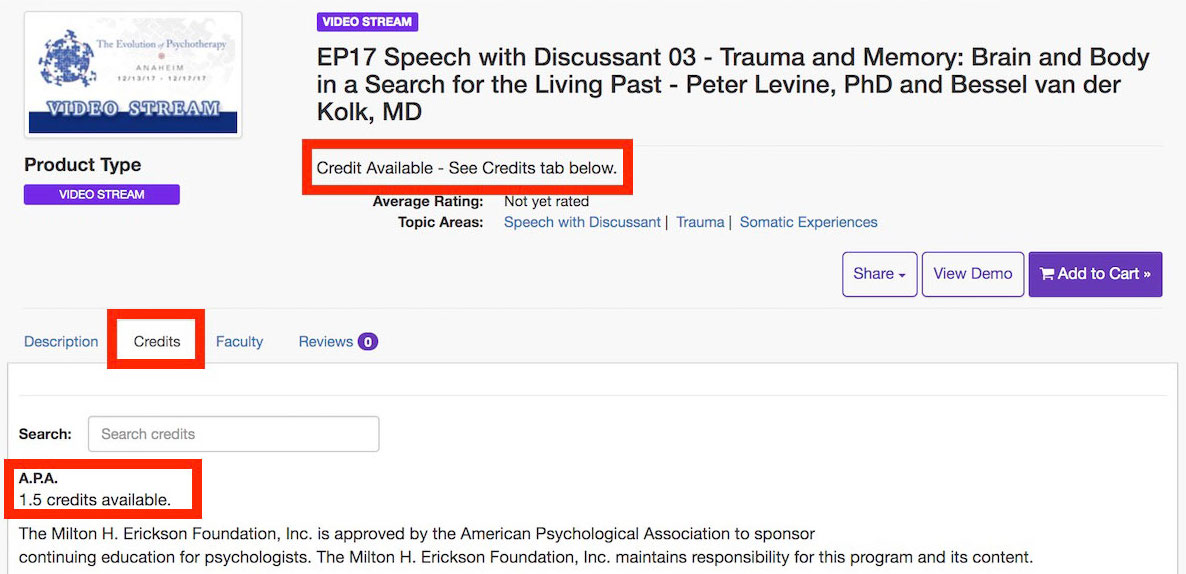
CE credit is only available for streaming products - CE credit is not available for downloadable products.
All of our Online CE content can only be accessed through the Erickson Foundation store portal. You must be logged in to view this content and complete the CE requirements. You can log in to your account by clicking here.
Refunds
The Erickson Foundation will provide a 100% refund if you are dissatisfied with any of our CE products. A request for refund must be made:
1. within 30 days of the purchase of the CE credit, and
2. prior to completing the CE quiz.
Refunds are not available once you have completed a CE quiz, whether or not you passed.
I Forgot My Password
If you have lost your account password, navigate to the log-in page. You will be able to enter your email address and click the "Forgot your password?" link. Your password will be emailed to you within minutes. In the event you don't see the email, please make sure to check your spam filter.
Support
If you need help at any point, just email us at our support email.


